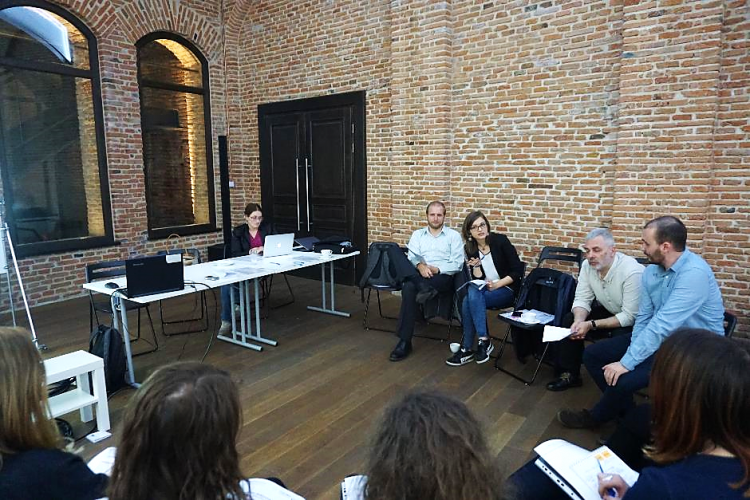The first ESPRESSO-Workshop took place at the 19th of April in Bucharest, in the ARCUB Gabroveni, and was a joint effort of the APUR (Asociația Profesională a Urbaniștilor din România) and URBASOFIA experts working under ISOCARP.
The aim of this workshop was to start an open dialogue with city authorities, policy makers, industry and NGOs on what challenges they face with respect of making cities more liveable, sustainable, efficient with the focus for future development of Smart Cities and potential roadmaps for integration. Interesting questions regarding the integration of Smart City solutions and the improvement of solutions offered to citizens were discussed as well as the question how can we make sure we speak the same language across Europe.
Key points
Smart City Concept (SC) is based on the idea of using technology as an enabler for cities development. What is sometimes missing from the explanation of a SC is the piece related to Smart citizens and Smart management. Therefore, SC should be seen as an umbrella concept, defined by using resources in an efficient and intelligent manner in order to achieve competitiveness.
Discussions have been focused on the following points:
- Smart city definition and understanding from different sectoral points of view. Does the word SMART best define the core idea behind contemporary, efficient, livable and sustainable cities? Isn’t „intelligent” a better description of the concept?
- The definition of an all-round Smart City should factor in a threshold of performance in sectorial systems. Oftentimes when discussing best practices, examples of relevance include a smart, but punctual solutions, which in the broader picture cannot transform city processes on a larger scale. The discussion centered on impact on resources (financial, environmental, human, etc.), rather than product or process – if investments in question generate a significant impact or outcome at local level in terms of integrating and making city systems more efficient in generating sustainable outputs and easy to manage, then the city could be considered smart.
- An integrated urban planning approach to SC – what are the most relevant sectors? Which are the most important standards that reveal the smartness of a city? In Romania and post-communist Eastern Europe in general, an important issue is the land ownership and incomplete cadaster (land register). Efficiently managing a city leverages essentially on integrating city systems, but without up-to-date spatial information pertaining to these systems, punctual investments will not yield results. A top priority is mapping out the city (including underground cadaster) and moving towards paperless planning.
- Mobility aspects are the second key issue considered highly relevant for Bucharest and Romania in general. The car is still representative for social status and the city is the second congested one in Europe.
Smart City? But what is a Dumb city?
- What is the role of public authorities in a SC? How can public bodies accelerate a city to become smart? Local administrations should be drivers for change, as within them lies the biggest barrier for SC deployment and upscaling – historical silo thinking. In order to change this and integrate city systems, a restructuring of the local administration is needed, which can be met with much resistance. Beside containerization, for local administrations the second issue is also the lack of know-how and existence of non-technological barriers – civil servants need good training and development programmes in order to be able to operate the solutions. Investments in hard infrastructure are tertiary next to (lower impact, more affordable) investments in human resources development and in development of a joint city database for city management.
- Romania and Bucharest are lagging behind in what concerns the penetration of smart technologies and tools for city management and development. However, much like the late development of the broadband infrastructure (which is now one of the fastest in the world), this can be seen as an opportunity for leapfrogging ahead. Open data and open source technology are key instruments for doing that – cities should make it a priority to migrate from using proprietary software.
- Involving the community: there is a reason why collaborative platforms and apps using crowdsourced information perform very well (such as the Waze app) – local administrations do not have the resources to constantly monitor „traditional” city infrastructure (without remote access intelligent solutions), hence involving individuals in the process of monitoring and reporting considerably reduces time and resources (validation is still necessary). This kind of approach could lay the foundation for real-time planning.
- Moreover, as cloud technology develops, a key selling point of smart systems technology is the fact that it is very easy to use (via an online portal) and does not require local resources.
- Key question: how can technology better play its role in a SC without alienating people and bring the most to a city development? The pitfalls of hypertechnologization as pointed out both in literature and in practice mostly pertain on the capacity of the society to maintain its community sense, identity, culture and tradition. Smart people and culture should be a top priority for SCs, and their development should be community-centric as opposed to technology-centric.
- Standards and the standardization process lay common grounds – this is essential for urban and regional planning, as a common language can not only enhance the transfer of best practice but also link cities together, facilitate trans-border cooperation and integrated development, promote investments in urban development
How do citizens and communities understand the concept of SC? What can we, as experts and professionals educate people to better understand SCs? How can we raise citizens trust in technology and determine them to embrace technology as a tool for SC development?
- The issue of trust is a vulnerability of the SC concept and mostly elderly are reticent towards e-services (e-payment, e-gov services, using online applications), albeit this mistrust witnesses a reduction as new generations teach the elderly.
Key smart city sectorial systems
In closing, it is clear that we have much to discover, discuss, understand about how Smart City technologies should be put to their best use. The workshop offered a great opportunity for a very focused discussion, and our aim is to replicate it next year, when ESPRESSO will yield its most important deliverables. Until then… join our Smart City Stakeholder Network (SmaCStak)!




